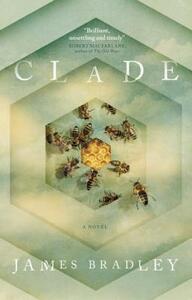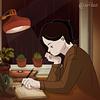Take a photo of a barcode or cover
I seem to be reading odd books lately and this is one. There's a little feel of Spin, Good Morning, Midnight and Station Eleven but it's not consistently as good as any of those.
An intriguing story with warnings of what might come. Well written and very enjoyable.
For me, this was unfortunately another example of books that lost their way in the attempt to say something important, in this case about our society and the environment, but ended up sacrificing story and characters to get there. This tried to do too much and the end result was chapters that felt episodic. I would have actually liked this a lot better as a collection of short stories (with a bit of editing).
This is how the apocalypse happens: one loss at a time. The pacing of these losses is incredibly well done here, and the element of hope that’s introduced in the end is unique and fitting.
A story of environmental collapse, this novel follows a related group of characters through several generations. Every section jumps ahead a decade or so, so you get a sense of change over time. Each jump follows someone different, which is a bit jarring: you have to play catchup to figure out how who you're following is connected (in one case I never did), which kind of ruins the emotional attachment. Otherwise it's a pretty quick and powerful portrayal of environmental panic.
I enjoyed this. Loved the concept, climate change has wreaked havoc across the world and generations of one family are living as best they can in the uncertainty. Perhaps because of the complex premise I felt some of the characterisations were lacking sympathy however this, and a few implausibilities (several 'oh come on' moments) didn't really detract.
Certainly a thought provoker.
Certainly a thought provoker.
Clade stopped me in my tracks. A novel which moves forward into the future as environmental changes continue, and societal change results, with a focus on one family. It does this through a series of snapshots, with unknown but large swaths of time inbetween, and jumping perspectives (as well as styles/tone). James Bradley says he felt Clade was like a piece of music, and he wanted it to work as images or motifs, stories that spoke to each other across the book. These little moments of different characters' lives are intimate; daily life and the struggles of human relationships continues as the world happens around them. One of the things I enjoyed about reading the book was the environment and all the scary changes happening are mentioned almost incidentally as part of the backdrop of living. There is one very dramatic scene, but otherwise it's not "this is the end of the world, we are all going to die!" Etc, but much more complex, insidious, gradual- as is climate change. (They lose coffee in the book, now that scared me!)
It's been described as a climate change book, a sci-fi, or a dystopian fiction, but I'm not sure I would say it is just any one of these, perhaps a skillfully crafted mixture.
The prose is stripped back, spare, but beautiful. It didn't shout at me to say "this is clever writing" , it just was.
I snapped up this book after the Future Tense session at Adelaide Writers' Week with the author, James Bradley, talking with Margaret Morgan, and chair David Sly- one of my surprise favourite sessions of the week!
This was a 4 star read for me, but has been bumped up to 5 star due to shear stickability - I've thought about it a lot since!!
It's been described as a climate change book, a sci-fi, or a dystopian fiction, but I'm not sure I would say it is just any one of these, perhaps a skillfully crafted mixture.
The prose is stripped back, spare, but beautiful. It didn't shout at me to say "this is clever writing" , it just was.
I snapped up this book after the Future Tense session at Adelaide Writers' Week with the author, James Bradley, talking with Margaret Morgan, and chair David Sly- one of my surprise favourite sessions of the week!
This was a 4 star read for me, but has been bumped up to 5 star due to shear stickability - I've thought about it a lot since!!
adventurous
dark
emotional
reflective
sad
tense
medium-paced
Plot or Character Driven:
A mix
Strong character development:
No
Loveable characters:
No
Diverse cast of characters:
Yes
Flaws of characters a main focus:
Yes
I’m committing to writing more reviews this year! Clade was a thoughtful collection of vignettes that bring readers through the life of a family whose lives are impacted by climate change in ways both surprising and real. In relatively few pages, Bradley fleshed out each character enough to make me really care about their survival and well-being. Highly recommended.
I’m reading ‘Clade’ for a prose fiction class and it certainly makes for a great discussion topic. While reading I went through a whirlwind of emotions: sadness, disgust, horror, and astonishment mostly. Mainly because the cover is so innocuous; I believed this book would have more to do with bees.
Bradley’s style is simple but his eloquence is obvious throughout. The fractured structure is interesting and his use of symbolism—especially at the beginning of the book—is a delight to reflect on. The science-fiction elements of this book were incredibly clever and eerily prophetic given today’s current circumstances. In saying this, some of Bradley’s representations could have been better. His depiction of an autistic character, while thought-provoking, is preceded by a grossly ableist narration from a neuro-typical protagonist that is never resolved. The female characters in this book are driven by a need to procreate and then described as being distant and even absent mothers while the male characters are hailed as heroic.
I actually had quite a few issues with this book. Why were members of the LGBTQ+ community still considered controversial by the masses? Was that necessary? Do we really need another book where the immediate response to learning about someone’s autism is an apology? Even if it’s represented in fiction, endorsing this kind of reaction only fosters harmful prejudices against minorities.
So yeah, this one wasn’t for me, but it still stands as a prime example of cli-fi and it’s still an interesting read. I’d recommend it to science-fiction buffs for sure but please be mindful of the current social climate and your own limits! (Warning: pandemic references, possibly triggering ableism, death of children, death on a global scale)
Madi
Bradley’s style is simple but his eloquence is obvious throughout. The fractured structure is interesting and his use of symbolism—especially at the beginning of the book—is a delight to reflect on. The science-fiction elements of this book were incredibly clever and eerily prophetic given today’s current circumstances. In saying this, some of Bradley’s representations could have been better. His depiction of an autistic character, while thought-provoking, is preceded by a grossly ableist narration from a neuro-typical protagonist that is never resolved. The female characters in this book are driven by a need to procreate and then described as being distant and even absent mothers while the male characters are hailed as heroic.
I actually had quite a few issues with this book. Why were members of the LGBTQ+ community still considered controversial by the masses? Was that necessary? Do we really need another book where the immediate response to learning about someone’s autism is an apology? Even if it’s represented in fiction, endorsing this kind of reaction only fosters harmful prejudices against minorities.
So yeah, this one wasn’t for me, but it still stands as a prime example of cli-fi and it’s still an interesting read. I’d recommend it to science-fiction buffs for sure but please be mindful of the current social climate and your own limits! (Warning: pandemic references, possibly triggering ableism, death of children, death on a global scale)
Madi




